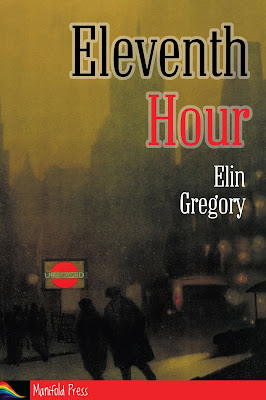A warm welcome to author Elin Gregory joining us here today at Love Bytes to talk about the release of her newest book “Eleventh Hour”.
Welcome Elin:)
Lili
When I first had the idea of writing about a gender fluid spy it was in the knowledge that he would have to tread a very fine line. While the nineteen twenties was one of the eras where, with care, a man could form an attachment and even have a long term relationship with another man it was at the price of pretending to be jolly good pals, sharing digs to make ends meet. Dress codes were rigidly enforced and while certain professions accepted some flamboyance, the services and the secret service did not. But the possibility that he would face some poor treatment from colleagues was just the tip of the ice berg. Well into the planning process I came across the terms gender-fluid and gender queer – ones I hadn’t heard before – and realised that was the type of person I was trying to describe. In the 1920s was gender fluidity even recognised as a concept?
A very little research brought up the case of Lili Elbe.
https://upload.wikimedia.org/wikipedia/commons/thumb/7/7d/Lili_Elbe_1926.jpg/800px-Lili_Elbe_1926.jpg
The story of Lili is both inspiring and heartbreaking. Two young artists met in college, fell in love and married. Einar and Gerda Wegener travelled around Europe painting as they went, mostly illustrative and commercial work, though Gerda also painted portraits in a very singular modern style. The art world was shaken when it was discovered that her most popular model, a stunning young woman, was actually her husband who by then had expressed a desire to transition fully, a desire supported by Gerda. In this Lili was one of the pioneers. It was an act of astonishing bravery, because as I had suspected, there was no vocabulary, either literary or medical, to describe Lili’s conviction that the body she inhabited was not right and needed to be changed in order for her to live the life she needed. But Lili was desperate to transition fully into her true form. My character, Miles, was generally quite happy as a young man, but on some days he wished to be seen as his female alter ego, Millie. This is an emotional need on his part, an act of liberation that makes him feel stronger and more confident and allows him to express a playfully assertive part of his personality that he normally has to keep hidden. Would this be seen as a valid depiction of his emotional needs or as a mockery of those who share the soul deep yearning of Lili? I sincerely hope not but if there are problems I’ll do my best to do better.
When I first had the idea of writing about a gender fluid spy it was in the knowledge that he would have to tread a very fine line. While the nineteen twenties was one of the eras where, with care, a man could form an attachment and even have a long term relationship with another man it was at the price of pretending to be jolly good pals, sharing digs to make ends meet. Dress codes were rigidly enforced and while certain professions accepted some flamboyance, the services and the secret service did not. But the possibility that he would face some poor treatment from colleagues was just the tip of the ice berg. Well into the planning process I came across the terms gender-fluid and gender queer – ones I hadn’t heard before – and realised that was the type of person I was trying to describe. In the 1920s was gender fluidity even recognised as a concept?
A very little research brought up the case of Lili Elbe.
https://upload.wikimedia.org/wikipedia/commons/thumb/7/7d/Lili_Elbe_1926.jpg/800px-Lili_Elbe_1926.jpg
The story of Lili is both inspiring and heartbreaking. Two young artists met in college, fell in love and married. Einar and Gerda Wegener travelled around Europe painting as they went, mostly illustrative and commercial work, though Gerda also painted portraits in a very singular modern style. The art world was shaken when it was discovered that her most popular model, a stunning young woman, was actually her husband who by then had expressed a desire to transition fully, a desire supported by Gerda. In this Lili was one of the pioneers. It was an act of astonishing bravery, because as I had suspected, there was no vocabulary, either literary or medical, to describe Lili’s conviction that the body she inhabited was not right and needed to be changed in order for her to live the life she needed. But Lili was desperate to transition fully into her true form. My character, Miles, was generally quite happy as a young man, but on some days he wished to be seen as his female alter ego, Millie. This is an emotional need on his part, an act of liberation that makes him feel stronger and more confident and allows him to express a playfully assertive part of his personality that he normally has to keep hidden. Would this be seen as a valid depiction of his emotional needs or as a mockery of those who share the soul deep yearning of Lili? I sincerely hope not but if there are problems I’ll do my best to do better.
Author: Elin Gregory
Release Date: August 1 2016
Length: 68,000 words
Buy Links
Blurb
Borrowed from the Secret Intelligence Service cipher department to assist Briers Allerdale – a field agent returning to 1920s London with news of a dangerous anarchist plot – Miles Siward moves into a “couples only” boarding house, posing as Allerdale’s “wife”. Miles relishes the opportunity to allow his alter ego, Millie, to spread her wings but if Miles wants the other agent’s respect he can never betray how much he enjoys being Millie now how attractive he finds Allerdale.
Pursuing a ruthless enemy who wants to throw Europe back into the horrors of the Great War, Briers and miles are helped and hindered by nosy landladies, Water Board officials, suave gentlemen representing foreign powers and their own increasing attraction to each other.
Will they catch their quarry? Will they find love? Could they hope for both?
The clock is ticking.
The clock is ticking.
Elin Gregory lives in South Wales and works in a museum in a castle built on the edge of a Roman Fort! She reckons that’s a pretty cool job.
Elin usually writes on historical subjects, and enjoys weaving the weird and wonderful facts she comes across in her research into her plots. She likes her heroes hard as nails but capable of tenderness when circumstances allow. Often they are in danger, frequently they have to make hard choices, but happy endings are always assured.
Current works in progress include one set during the Great War, another in WW2, one set in the Dark Ages and a series of contemporary romances set in a small town on the Welsh border.
@ElinGregory







